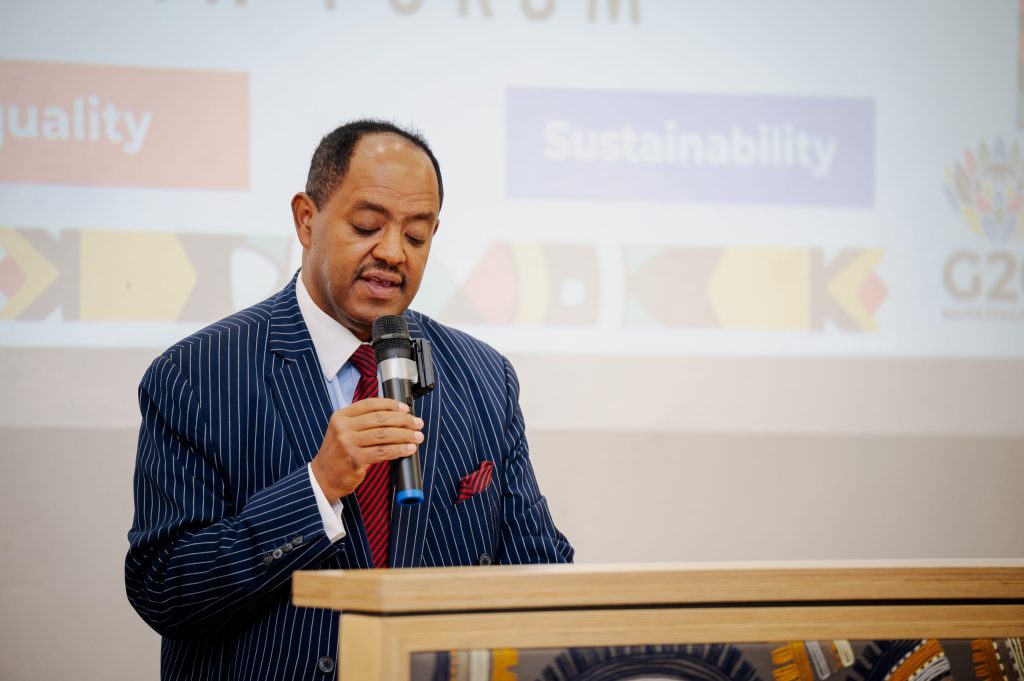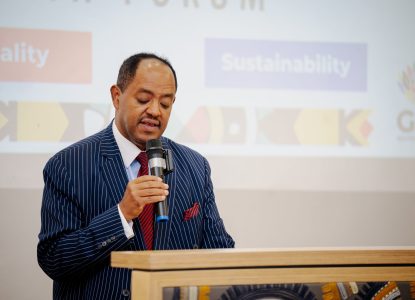By JoAnne Wadsworth, Communications Consultant, G20 Interfaith Forum.
– – –
On May 28-29, 2025, the G20 Interfaith Forum Association hosted Africa Week at Future Africa, University of Pretoria, bringing together interfaith representatives, youth leaders, and G20 engagement groups to explore how Africa’s diverse faith communities can meaningfully contribute to global governance. Ambassador Mussie Hailu Gebretsadik, Regional Director of the United Religions Initiative (URI) for Africa and Representative to the African Union and UN Office in Africa, delivered the opening keynote address that set the tone for two days of dialogue on solidarity, equality, and sustainability. His comprehensive vision for religious diplomacy, interfaith cooperation, and the transformative power of the Golden Rule provides a foundational framework for understanding how faith communities can shape Africa’s engagement with the G20. This represents the first of four blog posts capturing key insights from this landmark gathering.
As Africa navigates its historic role as a new member of the G20, with South Africa holding the 2025 presidency, the continent’s faith communities find themselves uniquely positioned to influence global governance. Ambassador Mussie Hailu’s address to the G20 Interfaith Forum Africa Week painted a compelling vision of how religious diplomacy and shared moral principles can drive meaningful change across the continent and beyond.

Celebrating African Unity and the G20 Opportunity
Ambassador Hailu opened by emphasizing the strategic importance of the moment. “This year is a good opportunity for Africa, as South Africa is the Presidency of the G20 Summit, and with AU being a member of G20,” he noted, highlighting how the African Union’s membership in the G20 provides unprecedented opportunities to shape global agendas on economic development, energy transition, and sustainability.
The Ambassador contextualized this opportunity within the broader framework of African unity and the AU’s Agenda 2063. “Agenda 2063 is Africa’s blueprint and master plan for transforming Africa into global powerhouse of the future. It is the continent’s strategic framework that aims to deliver on its call for inclusive and sustainable development and is also a concrete manifestation of the Pan African drive for unity, self-determination, freedom, progress and collective prosperity.”
This Pan-African vision, he argued, requires the active participation of all segments of society, particularly faith-based communities and spiritual leaders working together to build a prosperous and united Africa based on shared values and common destiny.
The Power of Religious Diplomacy
Central to Ambassador Hailu’s message was the transformative potential of religious diplomacy in addressing global challenges. “Religious diplomacy becomes a very important approach to bring peace and resolve conflict in different parts of the world,” he emphasized. “Religious diplomacy refers to the practice of leveraging religious belief institutions and leaders to foster dialog, promote peace and resolve conflict among different communities or nations.”
This approach, he argued, becomes particularly crucial when addressing issues that have deep moral and spiritual dimensions—environmental protection, climate change, security, peace, social justice, sustainable development, human dignity, and countering violent extremism. Faith communities, he stressed, must work together more than ever to address these interconnected challenges.
The Ambassador was particularly pointed about the responsibility of religious leaders to reject violence committed in the name of faith:
“Too often, acts of violence are committed in the name of religion, though this has nothing to do with the basic teaching of religion. Therefore, religious and spiritual leaders of the world should provide a powerful example in their common rejection of violence, terrorism, and they strongly need to defend the universal value of respect for life and the dignity of all individuals.”
The Golden Rule as Universal Foundation
Perhaps the most compelling element of Ambassador Hailu’s address was his emphasis on the Golden Rule as a unifying principle for global cooperation.
“It is high time for the faith community to assert that all major religions of the world teach the golden rule, which says, treat others the way you want to be treated… The teaching of the Golden Rule helps us to resist the force of division that spreads misunderstanding, disrespect and mistrust. The Golden Rule is the antidote to overcome hate-speech, discrimination, injustice, xenophobia and racism. … The golden rule is a very simple and yet profound action that can lead us from war to peace, from killing each other to peaceful coexistence, from disrespect to honoring each other, from hate to love, from despair to hope, from being selfish to live for the sake of others, and from holding grudges to forgiveness.”
Ubuntu and Personal Transformation
Complementing the Golden Rule, Ambassador Hailu emphasized Ubuntu—the African philosophy of interconnectedness—as another foundational principle for building harmony.
“Each and every one of us needs to practice and exert all our efforts to be a peaceful person, as peace is not something that can be handed out. We need to acknowledge that peace is only possible in our respective countries, when each and every one of us starts to make peace within ourselves, our families and in our respective communities. … Together, we must harness our rich diversity, cultural heritage and innovative spirit to shape a continent that thrives on peace, opportunities and … dignity for all based on the teaching of the golden rule.”
A Call to Action for Faith Communities
Ambassador Hailu’s vision offered a practical framework for how Africa’s faith communities can engage meaningfully with global governance structures. By emphasizing religious diplomacy, the Golden Rule, and Ubuntu as foundational principles, he outlined a distinctly African approach to international cooperation that prioritizes moral leadership, inclusive dialogue, and transformative change from the grassroots level.
As South Africa exercises its G20 presidency and the African Union solidifies its role as a permanent member, Ambassador Hailu’s call for faith communities to be “the voice for the voiceless” and to practice the Golden Rule in their daily lives provides a moral compass for navigating the complex challenges ahead. His message was clear: true global solidarity, equality, and sustainability can only be achieved when rooted in the universal values that connect all humanity—values that Africa’s rich spiritual traditions are uniquely positioned to champion on the world stage.
– – –
JoAnne Wadsworth is a Communications Consultant for the G20 Interfaith Forum Association and Editor of the Viewpoints Blog.


